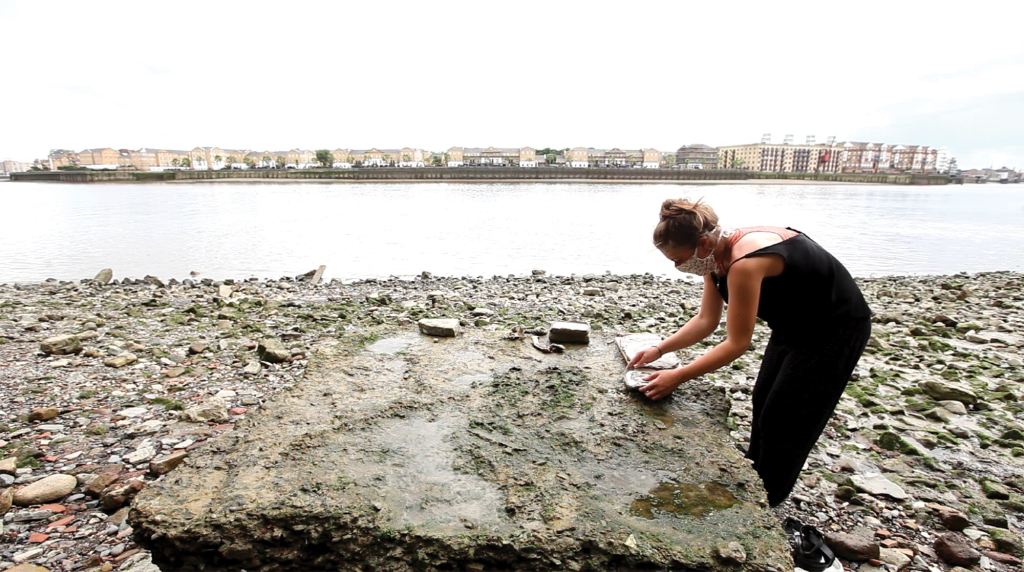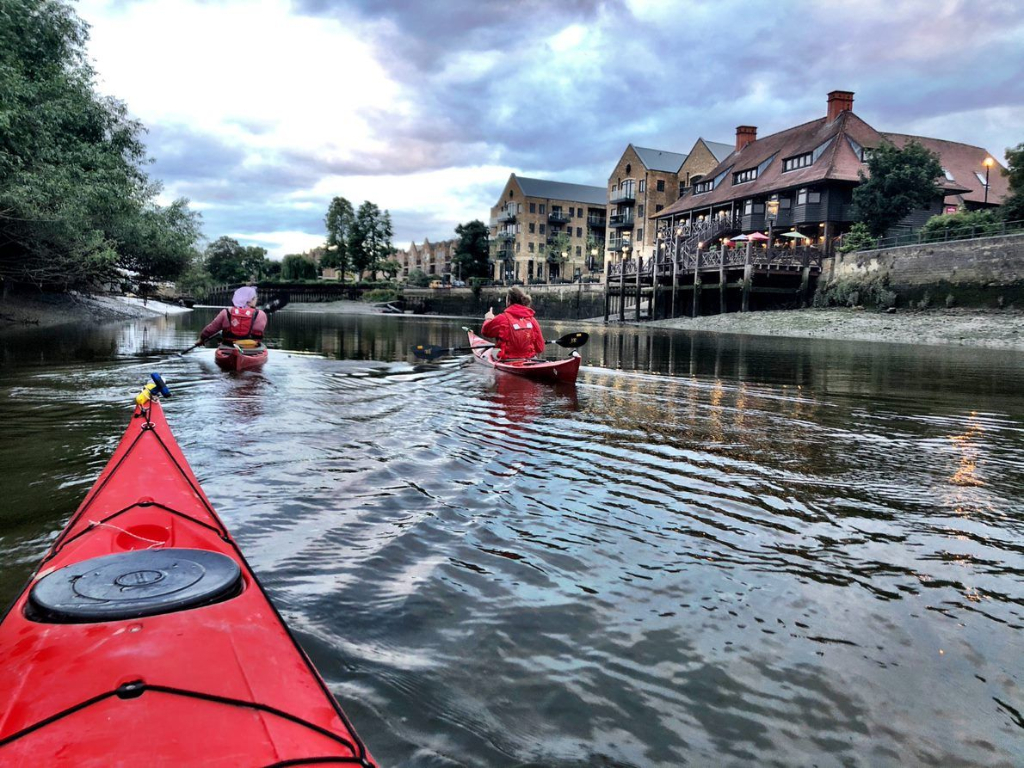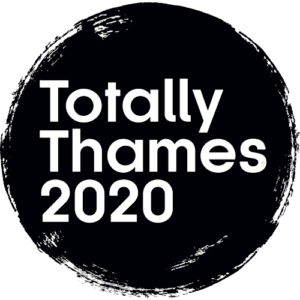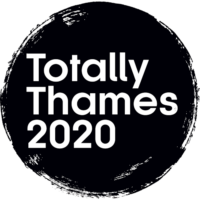Interview with Director of Totally Thames Festival Adrian Evans

Totally Thames Festival is in its 24th year of celebrating everything this most famous of landmarks has to offer. We spoke to Adrian Evans, director of this unique and innovative range of events, about the future of Totally Thames and how Covid-19 has impacted the festival this year.
As Director of Totally Thames, how does it feel to celebrate the festival in its 24th year?
Adrian Evans: We are living in extraordinary life-changing times and personally, I think that the effects of Covid-19 will be felt long after this year of lockdown. The pandemic has had a particularly devastating impact on the cultural sector, of which we are a part of. Totally Thames is both a cultural voice for the River Thames, encouraging us all to consider the significance and value of the Thames, and a nurturing context for artists, environmentalists, river lovers and river would-be-users. Now that lockdown is easing, I think we all need a little bit of encouragement to rediscover this wonderful city of ours. I hope that the 24th edition of Totally Thames will play a role in London’s recovery.
Having been born and raised in London, I, like so many others, have a personal affinity with the Thames, including its canals, docks and basins. Could you tell our readers a little about your connection with rivers and this most famous of waterways?
AE: I love the river. The Thames was once just a visceral presence in the lives of all Londoners, providing nourishment and connection to the country and a vital link to the outside world. Nowadays, it does much more than this. Its network of tributaries, canals and docks enrich our minds and souls with their culture, while the Thames’ twice-daily tidal flow gives an ever-changing fluid landscape to relish in. It is both beautiful and awesome; both young and old. Think of the Thames at Richmond, and then think of it again at Woolwich – the same river, yet significantly different in character. I don’t think that any other city in the world can boast such a majestic river.
Taking into account social distancing regulations, can you describe some of the challenges faced by the company when setting up the Rivers of the World project with 2,000 young people around the globe?
AE: From the very beginnings of lockdown, we made the decision to do whatever we could to honour the commitments we had made to both the artists and communities we were engaged with. Our flagship art education project, Rivers of the World, involves work from 14 artists in 72 schools in 12 locations around the world. Based on extensive discussions with teachers and partners, our commissioned artists generated remote learning tools to enable the project to proceed. Through the hardships that Covid-19 has inflicted upon us, I do feel a great sense of pride that Rivers of the World has been delivered and that young people experiencing lockdown around the world have created river-themed artworks. The display of this magnificent work exhibited beside the Thames near the Tate Modern is a testimony to the power of art and creativity in the face of a global pandemic.
The showcase is an innovative and uniquely interesting initiative, especially during these unprecedented times. What has the response been like to your open call for national and international submissions?
AE: We announced our open call early in 2020 with the deadline for submissions falling just before lockdown was announced. The response was particularly strong this year, and I am certain that if Covid-19 had not come along and rocked our world we would be looking forward to one of the best Totally Thames festivals ever. Of the hundred or so events we selected, some decided to defer to 2021, others elected to provide us with a digital interpretation, while some could proceed as planned while integrating social distancing measures. One of the positive elements to emerge is the acceleration of our digital platform. Late last year we decided to invest in a root and branch upgrade to our website. With the benefit of hindsight, never a better decision was made! We have just under fifty events this year under the Totally Thames umbrella and all will have a digital component, with 20 being “Digital Exclusive” events. We are hoping that this concentration of online work will extend our audience both demographically and geographically. Please go to our website and check it out.
Looking back at previous years of the festival, what have visitors been most moved by?
AE: I think that encouraging people to discover and enjoy the Thames in one way, shape or form is at the centre of our mission. You could say that we have done our job well either when we have successfully integrated cultural expression within the river landscape, or when we are surprising people with new river narratives. Last year’s Ship of Tolerance would be a good example of what success looks like for us. This piece was one in a series of new, public art commissions for the River Thames. Last year also provided us with our most successful exhibition Foragers of the Foreshore, which focused on mudlarks and their findings. One of the projects I was looking forward to most this year was a further investigation into this fascinating world – that will now have to wait until 2021.
It is awe-inspiring to discover that the river has been feeding and nurturing our population for millennia. Can you explain some of the ways in which the Thames’ existence has influenced and shaped the art world?
AE: In many ways, the Thames has helped to define London. Certainly, throughout the history of art a depiction of the Thames was used as a means to identify the city. In the years before the turn of the 20th century, drawing and painting would have been the principal forms of expression; in the 20th century, it was through photography and nowadays it’s through film. Think Harry Potter, James Bond and Mission Impossible. All used the river as a mechanism to identify London.
How has Totally Thames encouraged and supported young people to learn about and become more involved with the environment?
AE: We want to provide young people with rewarding opportunities to learn more about the importance of their local river environment. So, we spend most of our time and resources on education programmes. For 15 years we have worked in collaboration with the British Council to apply our project Rivers of the World in 38 countries. This year alone we are working with schools in Ethiopia, India, Lebanon, Morocco, Sudan and Tanzania. Schools in these countries are partnered with schools in the UK – this year in London, Peterborough, Coventry, Stockton-on-Tees, Halton and Warrington. The project challenges students to interpret river themes under the guidance of professional artists, thereby nurturing an understanding of their local river environment and an appreciation for the potential of art and creativity in their lives.
Covid-19 isn’t a pandemic we are likely to forget soon. One of the main positive outcomes of lockdown and social-distancing rules have been the effects on our environment, particularly lower levels of carbon emissions and pollution on a global level. What do you think the Thames will look like in months to come after things return to a pre-pandemic state of existence?
AE: I think we have to acknowledge that there must never be any let-up in initiatives to educate the general public about the damage that carbon emissions and pollution does to our environment. Lockdown saw amazing reductions in plastic pollution levels simply because people were stuck at home. Yet as soon as we were allowed out, indiscriminate littering of our parks and open spaces is pushing the pollution levels back up to pre-pandemic levels. We enjoy open spaces like the River Thames so much more when they are clean and litter-free, so why do people still feel it’s okay to pollute them? This is a real conundrum.
Do you have any advice for people eager to work in a field that so closely connects us with nature, as well as the ever-changing environment we live in?
AE: My advice is to be pro-active. There are loads of opportunities to volunteer with organisations such as Thames21. Time is running out. If you care about the environment, get out there and do something about it!
What are your favourite parts about being Director of Totally Thames and what are your plans for the company’s future?
AE: My favourites? Certainly meeting people who are involved with the Thames, or who are river lovers. Life’s rich tapestry is wrapped up in these characters and they never cease to amaze and delight. I also value the opportunities that we are able to offer artists and other creatives, whether this is advice, making connections or providing a platform for their work. I think creativity is a vital part of our DNA and I enjoy nurturing the creative process. I also like looking for secret Thames narratives. Next year (postponed from this year), I will be investigating the industrial heritage of Silvertown and North Woolwich – if anyone reading this has anything to contribute to this, please get in touch with me.
Selina Begum
Photo: Totally Thames
Totally Thames Festival runs from 1st September until 30th September 2020. For further information visit their website here.
To contact Adrian Evans email a.evans@totallythames.org.




























Facebook
Twitter
Instagram
YouTube
RSS